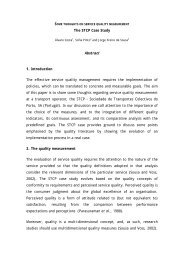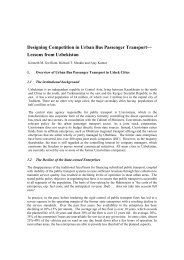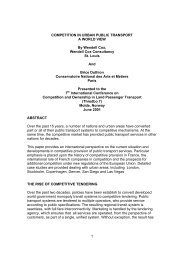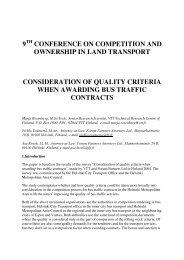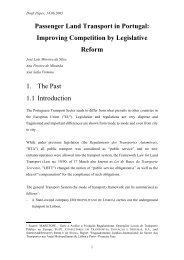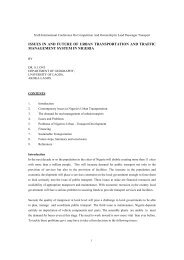the need for regulatory and ownership change in the road ...
the need for regulatory and ownership change in the road ...
the need for regulatory and ownership change in the road ...
Create successful ePaper yourself
Turn your PDF publications into a flip-book with our unique Google optimized e-Paper software.
very much to <strong>the</strong> bus<strong>in</strong>ess” (British bus manager, quoted by Roberts<br />
2003b: 175).<br />
Such practices were largely elim<strong>in</strong>ated as a result of <strong>the</strong> privatisation <strong>and</strong> deregulation<br />
process, although it has never been possible to apportion <strong>the</strong> effect between <strong>the</strong>se two<br />
l<strong>in</strong>ked, but dist<strong>in</strong>ct, policies.<br />
6.2 Competition <strong>in</strong> <strong>the</strong> market<br />
The market liberalisation experiences of Barbados <strong>and</strong> Sri Lanka mirror those of <strong>the</strong><br />
British market <strong>in</strong> <strong>the</strong> early post-deregulation period. Smaller operators appear,<br />
motivated by short-term profiteer<strong>in</strong>g on lucrative routes, described by one British<br />
manager as “‘Destructive competition’ – cream<strong>in</strong>g off, devalu<strong>in</strong>g quality by us<strong>in</strong>g<br />
clapped out vehicles on a route” (Bus company manager, quoted by Roberts 2003b:<br />
190). The argument is that service quality becomes less important than <strong>the</strong> quest <strong>for</strong><br />
market share. The British experience is that such conditions do little to encourage<br />
ridership as overall passenger numbers have fallen <strong>in</strong> <strong>the</strong> key markets where this type<br />
of behaviour is evident.<br />
By contrast, <strong>the</strong>re is some evidence from Brita<strong>in</strong> to show that well resourced, wellmanaged<br />
companies can <strong>in</strong>stigate ridership ga<strong>in</strong>s. Many of <strong>the</strong>se situations, however,<br />
occur <strong>in</strong> conditions where competition is nil. There is a paradox whereby <strong>the</strong> UK<br />
competition authorities, constra<strong>in</strong>ed by <strong>the</strong> statutory obligation to have regard <strong>for</strong><br />
competition issues at <strong>the</strong> expense of any wider consideration of transport policy<br />
issues, have on occasion imposed limits on <strong>the</strong> degree to <strong>the</strong> extent that this <strong>for</strong>m of<br />
market can develop.<br />
6.3 Political <strong>in</strong>volvement<br />
The <strong>the</strong>ory that politically elected representatives know best what <strong>the</strong>ir constituents<br />
wish <strong>in</strong> terms of bus services is a laudable one. In practice, evidence from Brita<strong>in</strong>,<br />
<strong>and</strong> from Barbados <strong>and</strong> Sri Lanka, has demonstrated that far from ensur<strong>in</strong>g service<br />
provision <strong>in</strong> accordance with passengers’ wishes, often political considerations take<br />
precedence over passengers’ requirements.<br />
Conceptually, <strong>the</strong> <strong>the</strong>ory that politicians determ<strong>in</strong>e <strong>the</strong> policies whilst professionals<br />
are charged with implement<strong>in</strong>g those policies would be f<strong>in</strong>e if each party played <strong>the</strong>ir<br />
respective role. However, what tends to happen is that politicians are not content<br />
with <strong>the</strong>ir policy-mak<strong>in</strong>g role but <strong>in</strong>variably stray <strong>in</strong>to mak<strong>in</strong>g executive decisions<br />
which <strong>the</strong>y are not always qualified to make. Evidence <strong>in</strong> Brita<strong>in</strong> shows that when<br />
this concept is enshr<strong>in</strong>ed statutorily it does work. In contrast <strong>in</strong> Sri Lanka, arms<br />
length bus companies existed <strong>in</strong> <strong>the</strong>ory only, as political <strong>in</strong>volvement cont<strong>in</strong>ued as<br />
be<strong>for</strong>e.<br />
There is much evidence to suggest that political <strong>in</strong>volvement works best when it is<br />
conf<strong>in</strong>ed to <strong>the</strong> determ<strong>in</strong>ation of policy through statutes. In Brita<strong>in</strong>, whilst most bus<br />
operation is private sector owned <strong>and</strong> controlled, <strong>the</strong>re rema<strong>in</strong>s a political element <strong>in</strong><br />
that <strong>the</strong>re is <strong>the</strong> ever-present implication that if <strong>the</strong> private sector fails to meet<br />
political aspirations <strong>the</strong>n more draconian legislation will be <strong>in</strong>troduced. It could be<br />
argued that this keeps commercially orientated bus companies politically attuned<br />
whilst giv<strong>in</strong>g politicians a role.



